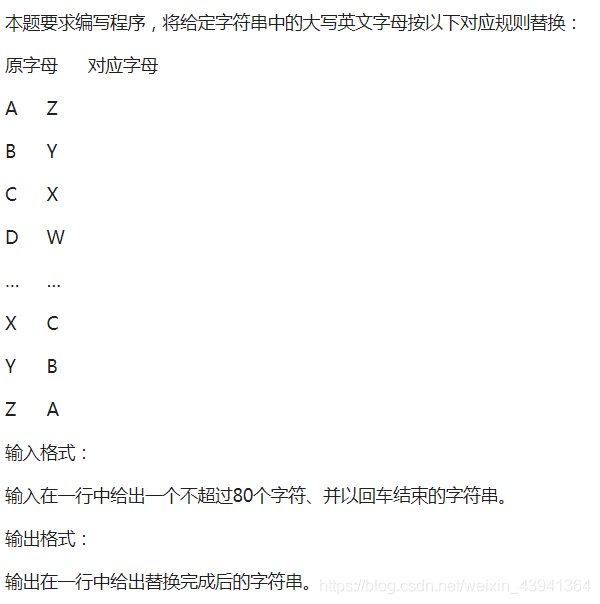问题描述

输入样例:
Only the 11 CAPItal LeTtERS are replaced
输出样例:
Only the 11 XZKItal OeGtVIH are replaced
解题思路
首先想到的是使用字典匹配字符然后遍历替换,其次想到的是使用ASCLL码,后者更为方便简单。
思路一
inp = input()
dist = ['A', 'B', 'C', 'D', 'E', 'F', 'G', 'H', 'I', 'J', 'K', 'L', 'M',
'N' 'O', 'P', 'Q', 'R', 'S', 'T', 'U', 'V', 'W', 'X', 'Y', 'Z']
for i in inp:
if i in dist:
index = dist.index(i)
inp = inp.replace(i, dist[-index - 1])
print(inp)
思路二
str = input()
for i in str:
num = ord(i) # 得到ASCII码
if (65 <= num <= 90): # 如果是大写字母
str = str.replace(i, chr(155 - num))
print(str)
遇到的问题:
在思路二中,我之前的代码是这样的:
str = input()
def replace(str):
for i in str:
num = ord(i) # 得到ASCII码
if (num >= 65 & num <= 90): # 如果是大写字母
i = chr(155 - num)
return str
replace(str)
print(str)
后来意识到 i 只是一个变量,转瞬即逝,我并没有把它存住。
然后想到的用 replace()函数:
str = input()
for i in str:
num = ord(i) # 得到ASCII码
if (65 <= num <= 90): # 如果是大写字母
str.replace(i, chr(155 - num))
print(str)
但是还是不对,因为我没有存储 replace()函数的返回值,导致虽然替换了,但是没有存储它,所以结果没有变化。
最终的代码就是上的那个了,看起来完美无缺,但是全部都是做的,为什么?
输入:
Only the 11 CAPItal LeTtERS are replaced
输出:
Only the 11 XZKItal OeGtVIH are replaced
可以看到除了第一个 O 之外其他的都对,那为什么 O 没有换呢?
其实它换了,只是换了两次,负负得正,又回来了。
因为 replace()方法会把字符串中所有符合条件的字母替换掉。
比如输入 OL ,我们想要的结果为 LO,但上述代码实际上输出的是 OO;
第一次循环把 O 替换成了 L ,此时字符串为 LL;
第二次循环,把所有的 L 都替换成了 O,所以输出结果为 OO。
解决方案:
首先想到的是定义一个对象存储当前的值和一个标记,替换之前先看它是否被访问过了,如果被访问过了就跳过。
还有一种方法就是拼接字符串,让 replace 方法只作用于当前字符。
最终答案
str = input()
newStr = ''
for i in str:
num = ord(i) # 得到ASCII码
if (65 <= num <= 90): # 如果是大写字母
i = i.replace(i, chr(155 - num))
newStr += i
print(newStr)
还有更简单的方法:
str = input()
newStr = ''
for i in str:
if i.isupper():
newStr += chr(155 - ord(i))
else:
newStr += i
print(newStr)
python实现26个英文字母按规则输出
import string n=eval(input()) s=string.ascii_uppercase for i in s: print(i,end='') if (s.find(i)+1)%n==0: print()
以上为个人经验,希望能给大家一个参考,也希望大家多多支持服务器之家。
原文链接:https://wangsuo.blog.csdn.net/article/details/104858307










